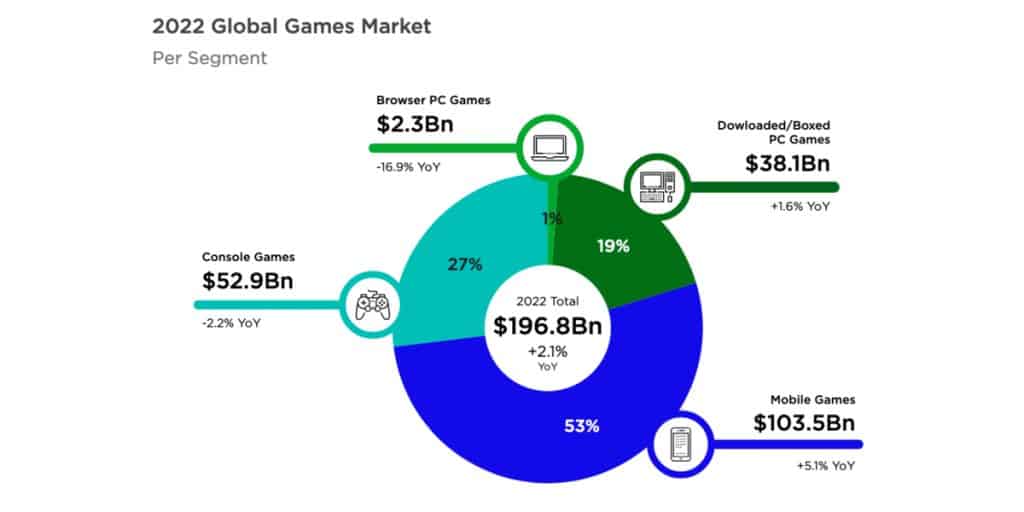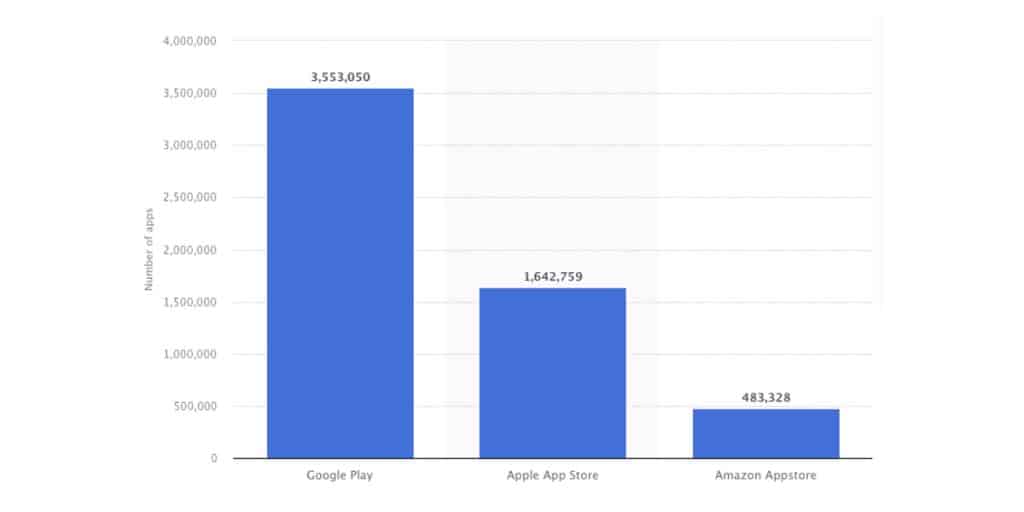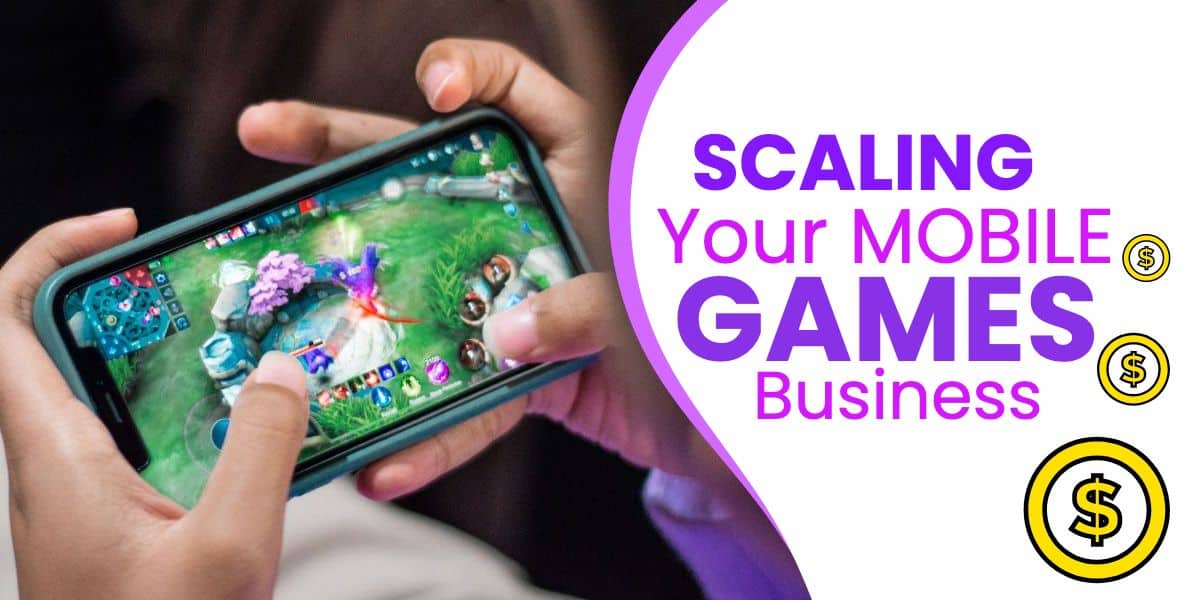Mobile gaming has become a rapidly expanding industry, as millions of people daily engage in gaming activities through their smartphones and tablets. However, the market has become highly competitive with the release of new games weekly.
The mobile gaming industry is expected to surpass the combined console and PC gaming market, accounting for about 55% of the global video game revenue by 2022. This growth trend will likely continue as traditional console and PC game publishers focus on mobile gaming due to its popularity and lucrative revenue potential. With the increasing availability of 5G networks in the coming years, more users are expected to join multiplayer mobile games, leading to a surge in the property market.
Despite mobile gaming’s dominance, cloud gaming is expected to be the fastest-growing segment in the industry, with an estimated expansion of $30 billion by 2030.
According to a report by data.ai, mobile games generated more than $105 billion in revenue in 2022, accounting for 53% of the global gaming market. Research and Markets predict that this trend will continue in the coming years. The mobile gaming market is projected to reach $272.2 billion by 2030, accounting for more than half of the gaming industry’s revenues.

The number of mobile gamers globally is projected to reach 2.8 billion by 2023, up from 2.2 billion in 2018, according to Newzoo. In the US, over 160 million people play mobile games, as reported by eMarketer.
As the mobile gaming market expands, so does the competition, with over 5 million apps available on both the Apple App Store and Google Play Store as of 2022. Mobile game developers and entrepreneurs must innovate constantly and find new ways to stand out in this highly competitive market.

Despite the challenges, there are still plenty of opportunities for success in mobile gaming. According to a survey by AdColony, 52% of mobile gamers are willing to watch ads in exchange for in-game rewards, while 41% prefer to make in-app purchases. Thus, developing a sound monetization strategy is vital to generate revenue from mobile games.
Entrepreneurs seeking to succeed in mobile gaming must have a clear vision for their game and an effective marketing plan, including market research to identify the target audience and the most valuable game features. Strong brand identity and social media presence are critical in generating buzz and driving downloads.
Other important considerations for mobile game entrepreneurs might include the following:
Develop partnerships with other companies to promote your game.
Partnering with other companies can be a very effective strategy for promoting your mobile game and reaching a wider audience. One way is to partner with other mobile game developers to cross-promote your game to each other’s audiences, which can be done through in-game advertising, social media campaigns, and even co-branding events and campaigns. Another option is to partner with a company in a related industry, such as an influencer or brand in the gaming entertainment or technology space. By collaborating on social media posts, sponsored content, or other activities, you can take advantage of their existing audience and increase the game’s popularity. For example, a mobile game developer might partner with a popular gaming YouTuber to create gameplay videos or reviews featuring their games or partner with a tech company to offer exclusive in-game items or promotions for their game’s customers. By developing strategic partnerships with other companies, mobile game studios can leverage their collective strengths and resources to reach new audiences, drive downloads and ultimately grow their businesses.
Possible partnership developments for a mobile game studio to promote their game could include:
- Social media influencers: Partner with social media influencers with large followings to promote the game through sponsored posts, live streams, and other marketing activities.
- Hardware Manufacturers: Partner with hardware manufacturers to promote the game on their devices or bundle it with their products. This can be done by pre-installing the game on the device or through co-marketing efforts to promote the game alongside the device. Another possibility is to bundle the game with a hardware purchase, incentivizing players to try out the competition. This type of partnership can be particularly effective when targeting a specific audience or demographic, such as gamers who prefer a particular hardware or operating system. Through this partnership, mobile game studios can increase their reach and exposure. At the same time, hardware manufacturers can offer additional value to their customers by providing them with high-quality mobile games.
- Branding and Sponsorship: Partner with brands to create branded content or in-game items that align with the brand’s image and message.
- In addition to commercial brands, non-governmental organizations (NGOs) or other organizations can also be valuable partners for mobile game studios regarding branding and sponsorship. Partnering with organizations that share the game studio’s values can help create in-game content or items that align with the organization’s mission and messaging. This can help raise awareness for important causes while generating revenue for the game studio. For example, a game studio focusing on environmental themes could partner with an environmental organization to create in-game items promoting sustainability and conservation. This kind of partnership can be a win-win situation for both parties, as the organization gains exposure to a new audience, and the game studio generates revenue through the sale of the branded content.
- Mobile carriers: Partnering with mobile carriers to promote the game to their subscribers through exclusive deals and promotions.
Mobile carriers can offer exclusive deals and promotions to subscribers, such as discounted data plans or in-game rewards, incentivizing players to download and engage with the game. Additionally, mobile carriers can promote the game through various channels such as push notifications, text messages, and social media, ensuring that their subscribers know the game’s existence. With millions of subscribers worldwide, partnering with mobile carriers can be an effective strategy for mobile game developers to increase their user base and generate revenue.
Creating a robust monetization strategy allows you to generate revenue from in-game purchases or advertising.
Creating a robust monetization strategy is essential for mobile game developers looking to generate revenue from their games. There are various ways to monetize a mobile game, including in-app purchases, in-game advertising, and subscriptions. In-app purchases allow players to buy virtual goods or currency within the game, while in-game advertising can include everything from banner ads to video ads to sponsorships. Subscriptions can offer players exclusive content or perks for a monthly fee. The key to a successful monetization strategy is to find the right balance between generating revenue and providing a great user experience which means avoiding overly intrusive ads, offering fair prices for in-game purchases, and ensuring that paid content doesn’t negatively impact gameplay. By carefully planning and implementing a monetization strategy that aligns with your target audience and game mechanics, you can generate a steady stream of revenue and support ongoing development and updates to your mobile game.
- In-App Advertising: Mobile game studios can use in-app advertising as monetization. They can show ads to users in exchange for in-game rewards, which can encourage players to watch ads and generate revenue for the studio.
- In-Game Purchases: In-game purchases are a popular way for mobile game studios to monetize their games. They can offer players virtual items, power-ups, or other bonuses, which can be purchased using real money.
- Subscription Model: The subscription model is another monetization strategy for mobile game studios. They can offer access to exclusive content, early access to new games, and other perks to subscribers.
- Sponsorship: Mobile game studios can generate revenue through sponsorships. They can partner with brands, integrate their products into the game, or offer sponsored in-game events and challenges.
- Cross-Promotion: Cross-promotion is another monetization strategy that mobile game studios can use. They can promote their other games within their current game, which can drive downloads and generate revenue.
- Premium Model: The premium model is another monetization strategy for mobile game studios. They can offer the game for a one-time fee, which gives players access to all the features and content without any additional in-game purchases.
- Rewarded Videos: Mobile game studios can use rewarded videos as a monetization strategy. They can offer players in-game rewards, such as virtual currency, for watching video ads.
- In-App Sponsorship: In-app sponsorship is another monetization strategy that mobile game studios can use. They can offer brands the opportunity to sponsor in-game items or offer sponsored events or challenges.
- Crowdfunding: Mobile game studios can generate revenue through crowdfunding. They can offer exclusive content or early access to backers, which can encourage players to support the game.
- In-App Surveys: In-app surveys are another monetization strategy for mobile game studios. They can offer players in-game rewards for completing surveys, which can generate revenue and provide valuable insights for the studio.
Stay up-to-date on the latest trends and technologies in the mobile gaming industry.
Staying up-to-date on the latest trends and technologies in the mobile gaming industry is crucial for mobile game developers and entrepreneurs who want to succeed in this highly competitive market. New technologies such as augmented reality, virtual reality, and cloud gaming are quickly changing the landscape of the mobile gaming industry, and developers who fail to keep up may risk falling behind the competition. Additionally, staying informed about industry trends, such as the growing popularity of mobile esports and the increasing demand for mobile games in emerging markets, can help developers identify new opportunities for growth and expansion. By keeping up with the latest trends and technologies, mobile game developers can always offer their players the most innovative and engaging experiences.
Moreover, the rise of NFTs and blockchain technology in the gaming industry is a significant development that mobile game developers and entrepreneurs must keep up with such new technologies. NFTs, or non-fungible tokens, are a new way to represent ownership of unique digital items such as in-game items, skins, and weapons, making it possible for players to trade and sell them outside the game. In addition, blockchain technology can provide players with more secure and transparent transactions, increasing player trust and enhancing the gaming experience. Developers who adopt these technologies will be able to offer their players more engaging and immersive experiences while staying ahead of the competition in this rapidly growing market.
Here are some strategies to help you stay ahead of the curve:
1) Follow industry publications: One of the best ways to stay informed about the latest developments in mobile gaming is to read industry publications and blogs. Some popular options include Pocket Gamer, Gamasutra, and Gamezebo.
In addition to staying up to date with the latest publications and industry news, mobile game entrepreneurs can benefit from following podcasts from leading mobile game studios. Podcasts like the one offered by Maysalward, a leading mobile game studio, can provide valuable insights into the industry, including trends, best practices, and innovative game development strategies. By following such podcasts, entrepreneurs can gain practical knowledge and learn from experienced industry professionals, which can help them to develop successful mobile games and achieve their goals. Moreover, the fact that Maysalward offers their podcast for free is a bonus, providing a valuable resource to mobile game entrepreneurs who may not have access to industry professionals or costly resources.
2)Attend conferences and events: Mobile gaming conferences and events are a great way to learn about new trends and technologies, connect with industry professionals, and gain insights into best practices. Some popular events include GDC, Gamescom, and E3 and also events like Pocket Gamer Connects.
While major markets like the US and China tend to dominate the mobile gaming industry, there are also significant opportunities in emerging markets that cater to specific regional industry activities. Events like the Pocket Gamer Connects Jordan are prime examples of such options. They enable industry professionals to connect and explore new markets, foster collaboration, and learn about emerging trends in specific regions. Such events serve as a platform to showcase unique and creative mobile games and give a voice to smaller regional developers who may not otherwise receive the recognition they deserve. Targeting these regional industry activities is vital to tapping into new markets and expanding the reach of mobile gaming globally.
3)Join industry groups and forums: There are many online groups and conferences dedicated to mobile gaming, where developers and enthusiasts share information, discuss new trends and technologies, and offer support and advice. Some popular groups include the Unity Mobile Gaming Group and the GameDev.net forums. Linkedin can be a source for such groups.
4)Monitor social media: Social media platforms like Twitter, LinkedIn, and Reddit can be valuable sources of information about the latest trends and developments in mobile gaming. Follow industry leaders and influencers, and keep an eye on relevant hashtags and discussions.
5)Experiment and test: Staying up-to-date in mobile gaming requires a willingness to experiment and test new ideas and technologies. Try new game engines, explore new monetization strategies, and experiment with different game mechanics to stay ahead of the curve and stand out in an increasingly competitive market.
By prioritizing the critical factors of innovation, differentiation, and a sound monetization strategy, mobile game entrepreneurs can increase their chances of succeeding in the highly competitive and rapidly growing mobile gaming industry.
Innovation is essential in the gaming industry because players’ needs and expectations constantly evolve, developing unique game concepts and features that capture the audience’s imagination.
Differentiating oneself from the crowd is another vital factor for success in the mobile gaming industry. With millions of games available in the app stores, having a distinct brand identity, effective marketing strategy, and leveraging social media to drive engagement and downloads are essential.
Moreover, developing a sound monetization strategy is crucial to generate revenue from the game can be achieved by offering in-app purchases or through ad-based revenue models.
By focusing on these critical factors, mobile game entrepreneurs can increase their chances of success in this exciting and fast-paced industry, bringing their games to the forefront of the mobile gaming market.
At Maysalward Mobile Game Studio, our vision is to continue to push the boundaries of mobile gaming, creating innovative, unique, and impactful mobile gaming experiences for all players. Our experienced and talented team will lead the way in modern game design, setting the standard for the interactive entertainment industry. We will strive to create unforgettable experiences and inspiring stories that will leave a lasting impression on our players. As a studio, we are committed to fostering a collaborative and creative environment, allowing us to constantly challenge ourselves, refine our craft, and be at the forefront of the mobile game industry.
Consequently, mobile gaming companies must find ways to stand out from their competitors and gain a larger audience. Developing exciting and engaging games with high-quality graphics, creating marketing campaigns, and leveraging digital advertising tools can help companies break into the market and compete against more established brands. Ultimately, mobile gaming businesses must focus on building strong customer relationships to survive in such a competitive environment.
